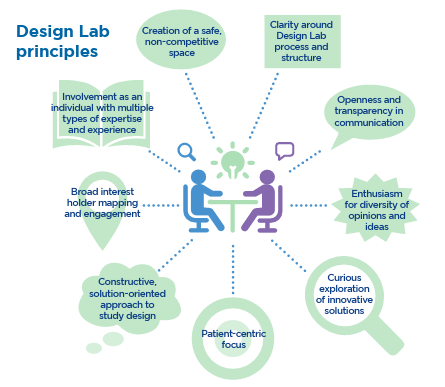Overview
This 10-module, non-credit certificate program is designed to train new investigators in clinical research, good clinical practice, and federal and local regulatory practices. The program is tailored to meet the needs of new investigators who may have previously served on a study team, but who have not yet been a PI on an industry-sponsored study or initiated their own study. Topics covered will include study protocols and budgets, regulatory processes, participant recruitment, and clinical trial maintenance.
The Blue Star Program is a blended learning experience requiring online pre-work and active participation at weekly live sessions. The next program will run in Fall 2025. Check back to this site in early 2025 for program dates and application deadlines.
Enrollment is limited and nomination from a supervisor is required. Enrollment is open to faculty at Tufts Medicine and Tufts University.
Completion of the CITI Biomedical Research Training and the GCP for Clinical Trials with Investigational Drugs and Medical Devices Training (approximately 6-12 hours) prior to program start is a required prerequisite for all accepted participants.
To apply
Nomination and application information for the 2025 program will be available in early 2025.
Frequently Asked Questions
What is the goal of the program?
The goal of the Blue Star Investigator Certificate program is to prepare investigators at Tufts Medicine to carry out their responsibilities as principal investigators in accordance with federal regulations and our local institutional processes. This program will promote best practices for the conduct of quality research.
What is the value of this certificate?
Those successfully progressing in the program will receive a certificate of completion presented by Tufts CTSI. This institutionally recognized program will present a tangible value to prospective sponsors, mentors, or collaborators as evidence of your readiness to conduct research.
Who should enroll in the program?
Faculty investigators at any level interested in mastering the fundamental practices of clinical trial management and conduct are welcome to apply. The curriculum has been designed for investigators in the early stage of building their research portfolios and seeking to become independent investigators or to serve as site PIs on industry studies. A cohort of 10-12 learners will be recruited to participate fully in mixed didactic and hands-on exercises.
What do I need to do to get the certificate?
You will be expected to attend and actively participate in all ten in-person modules. The program typically runs between Labor Day and Thanskgiving. Before all sessions, you will be asked to complete one hour of online pre-work. The online pre-work will be essential to inform active participation in the live session group exercises. You will be expected to develop a 3-minute elevator pitch and a 1-2 page proposal (Letter of Intent, LOI) for a clinical research protocol of your own design. In addition, all participants are required to complete module pre- and post-test surveys and the final program evaluation.
What are the prerequisites?
You will need to complete the CITI Biomedical Researchers training and the CITI Good Clinical Practice (GCP) training before the first live session. The prerequisite work takes about 6-12 hours to complete. You will need to submit proof of CITI training completion. You can access these trainings through the Tufts Health Sciences IRB.
What will I learn during the program?
Our curriculum covers essential skills in clinical research from conceiving a study protocol to the study close-out. Whether you plan to conduct an industry-sponsored protocol, or a protocol of your own, you will be able to anticipate the series of actions expected of you for a successful execution of your study. You will connect with a group of clinical trial expert mentors who will provide project guidance throughout the program.
Course Outline and Time Commitment
Total time will include 20 hours of live training and about one hour per week of online pre-work (30 hours total). You will agree to attend all sessions and acknowledge that participation data is used for reporting purposes according to the program metrics. All applicants will be asked to confirm that their supervisors have approved protected time to complete required program activities.
Current curriculum
Module 1: Introduction to the Blue Star Program and PI Responsibilities
In this module, participants will receive an introduction to the Blue Star Certificate Program and Tufts CTSI resources and will learn about investigator responsibilities. During break-out groups, participants will meet with project mentors.
Module 2: Study Protocols and Budgets
This module will identify the major components of a study protocol and a study budget, and describe the relationship between the protocol, the budget, and study feasibility. Participants will learn about resources available from Research Administration and the Compliance Department. During break-out groups, participants will develop a budget based on a study protocol.
Module 3: Recruitment, Retention & Engaging Stakeholders
The goal of this module is to understand the importance of integrating community and stakeholder perspectives into research and how stakeholder and community engagement can support study recruitment and retention. Participants will explore strategies for recruiting and retaining participants and discuss methods for including all populations in research.
Module 4: Research Design Workshop
In this module, participants will work on developing and refining their own research proposals. Mentors and faculty will be available for consultations and project feedback.
Module 5: Regulatory Review
In this module, researchers will learn about IRB review and approvals, common mistakes in protocols and consent forms, and practice writing in plain language. Participants will have the opportunity to discuss ethical challenges in clinal research.
Module 6: Adverse Event Reporting
This module will practice thematic scenarios applicable to all studies. Participants will learn about major grading systems such as Common Toxicity Criteria for Adverse Events, adverse event reporting criteria, and SUSARs. Participants will adjudicate a series of AEs, SAEs, and unanticipated problems for reporting to sponsors and regulators.
Module 7: Audit Readiness
This module will provide an overview of maintaining study documentation, assessment and monitoring, preparing for an audit, and maintaining “audit readiness”. Participants will learn to spot common errors found during audits and the PI’s role in audits.
Module 8: Promoting Your Research Ideas
This module will cover developing a plan for disseminating your research and developing a successful research pitch.
Module 9: Leading and Managing Research Teams
This module will go over topics related to managing a research team, including roles, responsibilities and expectations, and managing difficult conversations.
Module 10: Pitching Your Ideas and Program Reflection
In this final module, participants will present a 3-minute pitch of a clinical study idea to a panel of mentors and receive feedback. The module session will conclude with a program reflection discussion.
Contact
If you have any questions, please contact Project Manager Patricia Reyes.



